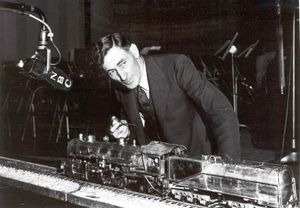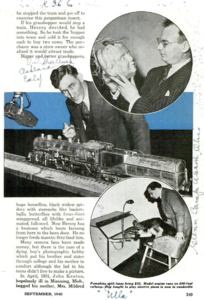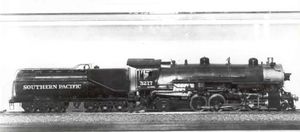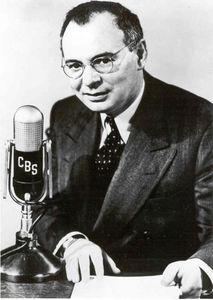A Famous Locomotive On The Airwaves: Difference between revisions
(Created page with "In October 1938, the Vic Shattock was invited to New York to be a guest on the old "Hobby Lobby" weekly radio show. Various guests would appear throughout the season to "Lobby...") |
No edit summary |
||
| (5 intermediate revisions by the same user not shown) | |||
| Line 1: | Line 1: | ||
[[Category:History]] | |||
The | "Hobby Lobby" was a weekly radio show that was carried on one of the National networks of the day. The show invited various listeners to apply to be on the show and tell the folks at home all about what they pursued in their spare time. Or as show creator "Dave Elman" explained: To "Lobby for their Hobby"... | ||
Didn't matter if it was stamp collecting, butterfly collecting, woodworking or any number of possibilities, if the Show's producers thought your hobby was worthy, you got to be on the Show. It was primarily sponsored by "Fels & Co."-- longtime makers of Fels-Naptha Laundry Soap and Fels-Naptha Soap Chips. | |||
After applying to be on the show and originally declined by the producers, "Vic Shattock, an Employee of the Southern Pacific Railroad" was invited to be on the weekly spot, on a National radio hookup. He was to bring a locomotive and accessories required to New York City to "Lobby for his unusual Hobby". The Southern Pacific seized upon this moment and personally got involved. Vic and his wife Maude were provided transportation to New York City courtesy of SP. They were put up in the Waldorf-Astoria hotel. A Mikado-type steam locomotive was chosen from the basement collection. His small Mike # 3217, an MK-4 Class. It was packed in a special box with required track and accessories and placed in the confines of an SP baggage car for the long trip ahead. | |||
The actual broadcast was on the evening of October 19, 1938. This engine gained the reputation of being the only miniature live steam engine to be heard over a National radio hookup. The engine was fired-up at Radio City and the sounds of the exhaust, whistle and cylinder cocks picked up by a nearby microphone. | |||
Vic's employer, the Southern Pacific, picked up all the expenses of this great experience. After the broadcast was over, Vic and his wife took the train home to Oakland, Calif. However, the locomotive stayed in New York for a few weeks to grace the window of SP's ticket office. The SP later shipped the engine back to Vic in California. During the transit, it was dropped by somebody. However, it was packed so well that no damage took place. | Vic's employer, the Southern Pacific, picked up all the expenses of this great experience. After the broadcast was over, Vic and his wife took the train home to Oakland, Calif. However, the locomotive stayed in New York for a few weeks to grace the window of SP's ticket office. The SP later shipped the engine back to Vic in California. During the transit, it was dropped by somebody. However, it was packed so well that no damage took place. | ||
| Line 15: | Line 21: | ||
<gallery widths="300px" heights="300px"> | <gallery widths="300px" heights="300px"> | ||
File:VictorShattock SP3217 HobbyLobbyNYC.jpg|Vic Shattock and SP # 3217 at the "Hobby Lobby" broadcast in New York City, October 19, 1938. | File:VictorShattock SP3217 HobbyLobbyNYC.jpg|Vic Shattock and SP # 3217 at the "Hobby Lobby" broadcast in New York City, October 19, 1938. | ||
File:VicShattock 1940-09 p349.PNG|Same photo as it appeared in Popular Mechanics article entitled "Cashing In On Hobbies", by Dave Elman | File:VicShattock 1940-09 p349.PNG|Same photo as it appeared in Popular Mechanics article entitled "Cashing In On Hobbies", by Dave Elman, September 1940, page 349. | ||
File:VictorShattock SP3217 ArizonaPioneerHistoricalMuseum.jpg|Victor Shattock's SP # 3217 in the Arizona Pioneer Historical Museum in Tucson. | File:VictorShattock SP3217 ArizonaPioneerHistoricalMuseum.jpg|Victor Shattock's SP # 3217 in the Arizona Pioneer Historical Museum in Tucson. | ||
File:DaveElman of Hobby Lobby Radio Show.jpg|Dave Elman, the | File:DaveElman of Hobby Lobby Radio Show.jpg|Dave Elman, the host and director of "Hobby Lobby" radio show. | ||
</gallery> | </gallery> | ||
== References == | |||
* [http://www.trainorders.com/discussion/read.php?11,2617438 "Vic Shattock on Hobby Lobby Show", <i>TrainOrders.com</i>] | |||
* [https://en.wikipedia.org/wiki/Dave_Elman Dave Elman, Wikipedia] | |||
Latest revision as of 12:57, 10 September 2013
"Hobby Lobby" was a weekly radio show that was carried on one of the National networks of the day. The show invited various listeners to apply to be on the show and tell the folks at home all about what they pursued in their spare time. Or as show creator "Dave Elman" explained: To "Lobby for their Hobby"...
Didn't matter if it was stamp collecting, butterfly collecting, woodworking or any number of possibilities, if the Show's producers thought your hobby was worthy, you got to be on the Show. It was primarily sponsored by "Fels & Co."-- longtime makers of Fels-Naptha Laundry Soap and Fels-Naptha Soap Chips.
After applying to be on the show and originally declined by the producers, "Vic Shattock, an Employee of the Southern Pacific Railroad" was invited to be on the weekly spot, on a National radio hookup. He was to bring a locomotive and accessories required to New York City to "Lobby for his unusual Hobby". The Southern Pacific seized upon this moment and personally got involved. Vic and his wife Maude were provided transportation to New York City courtesy of SP. They were put up in the Waldorf-Astoria hotel. A Mikado-type steam locomotive was chosen from the basement collection. His small Mike # 3217, an MK-4 Class. It was packed in a special box with required track and accessories and placed in the confines of an SP baggage car for the long trip ahead.
The actual broadcast was on the evening of October 19, 1938. This engine gained the reputation of being the only miniature live steam engine to be heard over a National radio hookup. The engine was fired-up at Radio City and the sounds of the exhaust, whistle and cylinder cocks picked up by a nearby microphone.
Vic's employer, the Southern Pacific, picked up all the expenses of this great experience. After the broadcast was over, Vic and his wife took the train home to Oakland, Calif. However, the locomotive stayed in New York for a few weeks to grace the window of SP's ticket office. The SP later shipped the engine back to Vic in California. During the transit, it was dropped by somebody. However, it was packed so well that no damage took place.
After returning to California, # 3217 was custom painted by SP shop personnel along with big sister, MK-6 # 3254. There were only FIVE locomotives that Vic ever painted. These were two of them. All of his many others were left in polished brass. The other painted locomotives were SP 0-6-0 # 1207, SP 4-6-2 # 2422 (the 1st), and SP 2-8-0 # 2753.
SP # 3217 (the Hobby Lobby locomotive) continued in service on Vic's famous basement railroad in Oakland as well as at the original track in Oakland of the Golden Gate Live Steamers in Redwood Regional Park.
In 1968, Vic presented # 3217 as a gift to Mr. A.S. McCann, SP Western Division Superintendent. Mr. McCann was transferred to Tucson, AZ where he later passed away. The engine was displayed for a while in the Arizona Pioneer Historical Museum in Tucson.
Today, this famous little locomotive is lost. No one seems to know whatever happened to it after all of these years.



